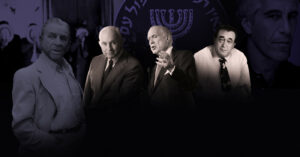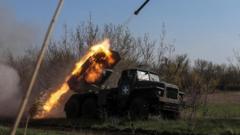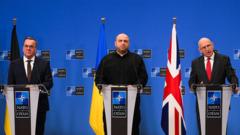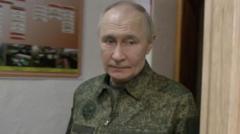The former head of the British Army, famously nicknamed “the Prince of Darkness,” will be remembered for his courageous stand against potential global conflict during the Balkans war.
Remembering General Michael Jackson: A Defiant Leader and Military Icon

Remembering General Michael Jackson: A Defiant Leader and Military Icon
General Michael Jackson, known for his bold decisions during a critical moment in military history, passed away at 80.
In a significant loss to military leadership, General Michael Jackson, former head of the British Army, passed away at the age of 80 on October 15. His death was confirmed by the British Army, though further details regarding the circumstances remain undisclosed.
Known as “the Prince of Darkness,” a moniker highlighting his commanding presence and distinctive voice, Jackson rose to prominence during the tumultuous period of the Yugoslav wars. In June 1999, he stood at the helm of British forces in the Balkans as NATO intervention aimed to mandate a Serbian troop withdrawal from Kosovo.
During this era, a critical confrontation occurred when Russian troops unexpectedly seized control of a Pristina airfield, leading NATO’s supreme commander, General Wesley K. Clark, to order Jackson to secure the runways at all costs. Jackson’s response to Clark, where he notably stated, “It’s not worth starting World War III,” would solidify his legacy as a leader unafraid to defy orders in the face of potential global repercussions.
This act of insubordination led to discussions among their superiors—including General Clark’s commanding officers and Jackson’s British senior officials—but ultimately took a turn in Jackson's favor. This decision emphasizes the tension and complexity of military chains of command, especially in critical situations.
In British media, Jackson further drew attention for his boldness, earning the nickname “Macho Jacko.” His decisive refusal to escalate military tensions reverberates as a testament to his strategic acumen during one of NATO’s precarious moments in history. Jackson’s legacy lives on in the annals of military history as a figure whose principles guided him through adversity, advocating for caution over potential conflict.
Known as “the Prince of Darkness,” a moniker highlighting his commanding presence and distinctive voice, Jackson rose to prominence during the tumultuous period of the Yugoslav wars. In June 1999, he stood at the helm of British forces in the Balkans as NATO intervention aimed to mandate a Serbian troop withdrawal from Kosovo.
During this era, a critical confrontation occurred when Russian troops unexpectedly seized control of a Pristina airfield, leading NATO’s supreme commander, General Wesley K. Clark, to order Jackson to secure the runways at all costs. Jackson’s response to Clark, where he notably stated, “It’s not worth starting World War III,” would solidify his legacy as a leader unafraid to defy orders in the face of potential global repercussions.
This act of insubordination led to discussions among their superiors—including General Clark’s commanding officers and Jackson’s British senior officials—but ultimately took a turn in Jackson's favor. This decision emphasizes the tension and complexity of military chains of command, especially in critical situations.
In British media, Jackson further drew attention for his boldness, earning the nickname “Macho Jacko.” His decisive refusal to escalate military tensions reverberates as a testament to his strategic acumen during one of NATO’s precarious moments in history. Jackson’s legacy lives on in the annals of military history as a figure whose principles guided him through adversity, advocating for caution over potential conflict.






















